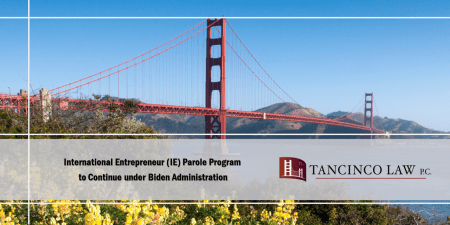In 2016, the Obama Administration created the International Entrepreneur Parole (IEP) Program. It was established with the purpose of granting parole status to an applicant who is an “entrepreneur” of a start-up who takes an active role in the operations and growth of the business. The program was set to begin in July 2017, but the Trump administration pushed the start date to the following year, citing an executive order looking to crack down on parole abuse. The Trump administration then through a proposed rule published on May 29, 2018, suggested eliminating the program, saying the policy didn’t adequately protect U.S. workers and that parole wasn’t an appropriate vehicle to attract or retain international entrepreneurs.
On May 10, 2021, the U.S. Department of Homeland Security announced that the IEP program will no longer be revoked but in fact will continue to implement the program pursuant to existing regulations contained in 8 CFR 212.19.
Under this program the entrepreneur must have recently formed a new start-up entity within three years before the date of filing the initial parole application. Unlike an investors visa where the entrepreneur must show infusion of capital to the business that is formed from his own resources, an international entrepreneur seeking parole must show that the start-up business has potential for a “rapid growth and job creation.”
There are 3 alternative ways to prove this:
- first, that the business has significant U.S. capital investment of $345,000 or from established U.S. investors such as venture capital firms, angel investors and the like who have a history of substantial investment in successful start-up entities;
- second, the business received government funding of grants totaling $100,000 or more; and,
- third, any reliable and compelling evidence that will prove significant public benefit to the United States.
If an IE Parole application is approved, the entrepreneur, his/her spouse and minor children will be paroled into the United States and will receive employment authorization documents. Parole will be granted for up to 2 years and may be renewed for up to 3 years.
More than 50 percent of start-ups in the United States with a $1 billion valuation were founded by at least one immigrant. This IE Parole program is significantly beneficial to U.S. public interest considering that the United States is a popular destination for start-up founders, but many other countries (including Canada, the United Kingdom, China, Japan, Israel, Germany, Australia, and New Zealand) are competing to entice entrepreneurs to their shores.


